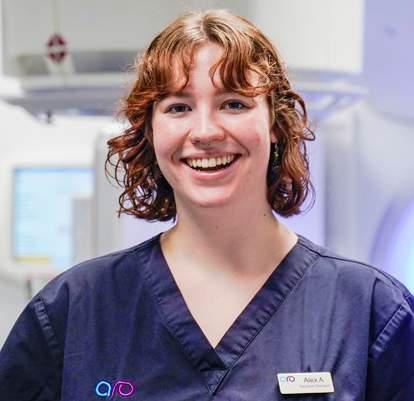
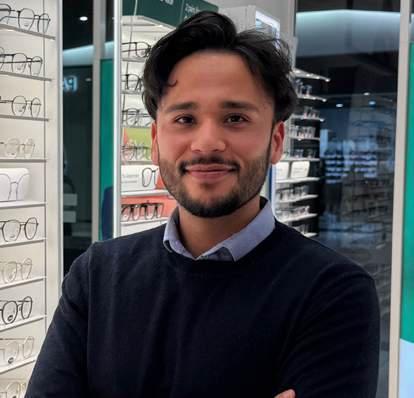
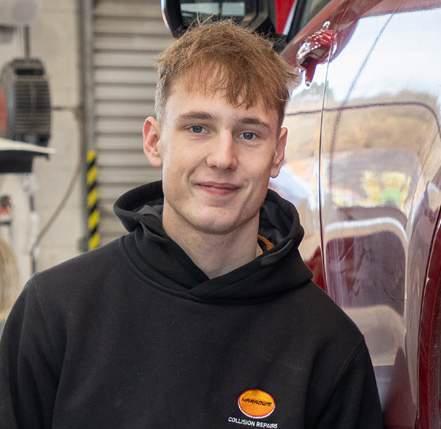
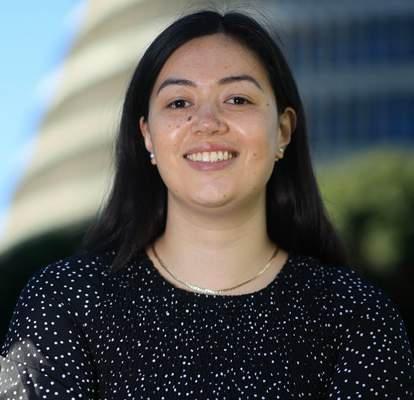
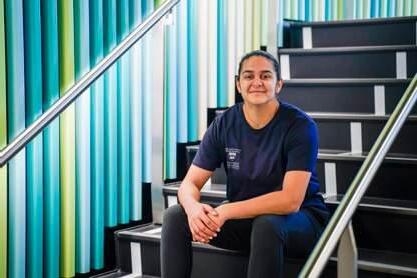
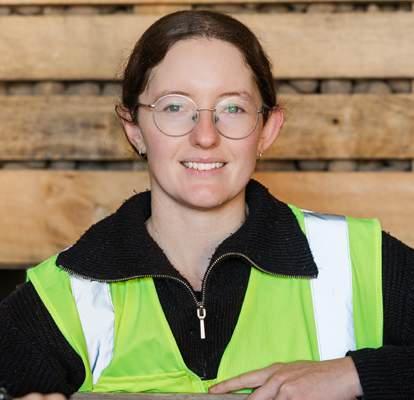
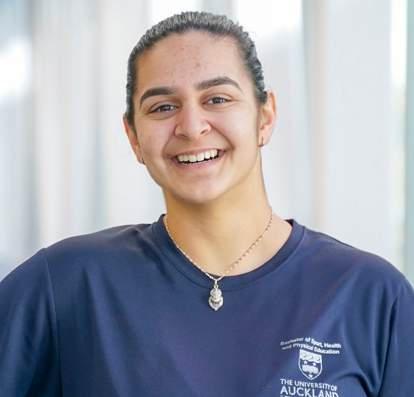


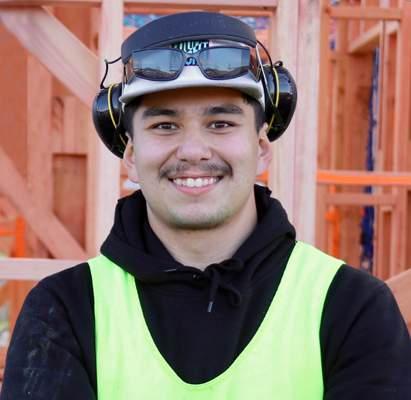

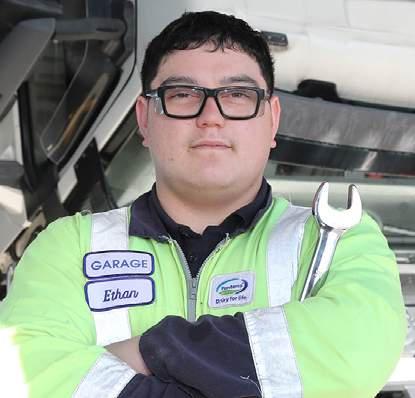
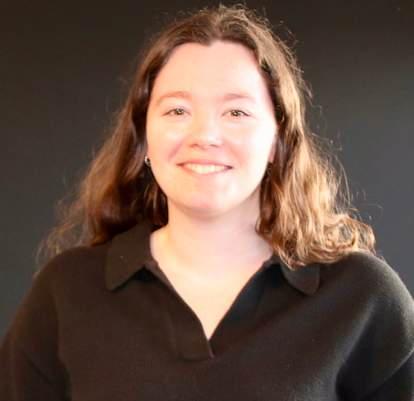






















MANAGING EDITOR
Oliver Lee
SUB-EDITOR
Peter White
CONTRIBUTING WRITERS
Sara Carbery, Diana Clement, Peter White PHOTOGRAPHERS
John Davidson, Thomas Greenaway, Marty Melville, Joanne McCloy, Paula McInnes, Peter McDermott, Pete Nikolaison, Sav Schulman, Jason Shen, Zach Stark, Nicola Wilhelmsen
DESIGN & LAYOUT
Mervyn Hurley
HNZL 2014 Limited
PRINTER
Webstar, Auckland PUBLISHER
T: +64 274 599 503
E: oliver@oliverlee.co.nz
W: oliverlee.co.nz
ISSN 2463-3380 (Print)
ISSN 2463-3399 (Online)
COPYRIGHT: Reproduction in whole or in part by any means is prohibited. DISCLAIMER: The opinions expressed in this magazine do not necessarily reflect the opinions of the publisher. Although all material is checked for accuracy, no liability is assumed by the publisher for any loss due to use of material in this magazine.



04 RADIATION THERAPIST | ALEX ANDERSON
Combining science, technology and compassionate care is important for this recent graduate.
06 GEOGRAPHIC INFORMATION SYSTEMS (GIS) ANALYST | KIMBERLEY D’ARCY
A career change from teaching to Geographic Information Systems (GIS).
07 PRIMARY INDUSTRIES | FFION WHITE

08 POTATO SEED MANAGER | BRIDGETT JAMES
There are varied job opportunities in the potato industry in New Zealand.
09 BACHELOR OF SPORT | ROSHNI OBEROI
Wanting to help others discover the joy of sport is driving this University of Auckland student.
10 AUTOMOTIVE REFINISHER | EMMA SIMPSON
Meet the 20-year-old who won the nationwide Golden Gun Award for vehicle refinishing.
11 COLLISION REPAIR TECHNICIAN | LACHLAN CHATFIELD
The Golden Hammer Award-winner loves making damaged vehicles look beautiful again.




A scholarship from MPI helped Ffion financially and opened doors in the primary industry sector.
12 OPTOMETRIST | RISHI KHATTAR
Rishi is passionate about shaping the next generation of young optometrists.
14 HEAVY AUTOMOTIVE TECHNICIAN | ETHAN DEVERY
This 19-year-old apprentice loves the work environment and opportunities at Fonterra.
15 ELECTRICIAN | BROOKE ELLIS
An electrician and instrumentation apprenticeship with Fonterra opens up great career opportunities.
16 NOTICEBOARD
Key dates, websites and information are all collated in one easy-to-find spot.
18 BUILDER | TIM HAYES
Top apprentice builder loves being able to see a job through from start to finish.
20 AUDITOR | LOGAN KEENAN
This one-time volunteer firefighter loves meeting clients in his role as an auditor.
21 SYSTEMS ACCOUNTANT | SARAH O’CONNOR
Working as a systems accountant with the Treasury in Wellington brings many rewards.
22 ARCHITECT | JESSICA TREGIDGA
A two-year Diploma in Architectural Technology from Unitec gave Jessica a solid foundation in architecture.
24 MARKETING | ISABELLA McLEAY
University of Otago graduate is forging a successful career path in the petcare, snacking, food and nutrition industry.
26 BIOMEDICAL SCIENCE | GRACE SCOTT
Developing drugs to treat diseases and the developments to come in the future. 27 ENTREPRENEUR | GABE ROSS
Young entrepreneur is passionate about the outdoors and promoting sustainability.
28 STUDENT DEBT | Student loans must be paid back so plan your spending well before you borrow.
29 FORESTRY | LIAM WALKER
This recent graduate is passionate about making a difference focused on the New Zealand forests.
30 EMPLOYMENT TIPS | Seven good skills to have as you prepare for your first interview.




“If there’s one decision in my life that I’m absolutely sure about, it’s choosing to become a radiation therapist,” says ALEX ANDERSON. “It’s a role that combines science, technology and compassionate patient care in a really unique way.”
It was Alex’s Year 12 Chemistry teacher who encouraged her to look at radiation therapy – the treatment of cancer using high energy x-rays to destroy cancer cells.
“She knew I was looking for a career that combined patient care with something technical and medical. I have always had a lot of empathy to give, and I was really drawn to the idea of supporting people through what can be one of the most vulnerable times in their lives.”
The Bachelor of Radiation Therapy is a three-year degree taught from the University of Otago’s Wellington campus.
The structure of the programme – two years of academic study at the University of Otago's Wellington Campus, as well as two six-month placements in second and third year at radiation therapy departments around New Zealand – means that students are well-prepared to enter the workforce when they graduate.
“It was a very hands-on, real-world learning experience. One of the things that made the degree so special was the tight-knit nature of our cohort. We learned in small, supportive classroom environments where everyone knew each other.
“I found the content very engaging and meaningful, and every day I came home excited to share what I’d learned, whether it was about cancer biology, patient care, or even practising tattooing on oranges to simulate the tattoo dots we give patients for treatment setup.”
Having enrolled in the course straight from school, 21-year-old Alex is the youngest radiation therapist at Auckland Radiation Oncology (ARO).
“Patients are often surprised that I’m fully qualified at this age, and to be honest, sometimes I surprise myself too. Stepping into a professional healthcare role so young has been incredibly rewarding and I’ve learned so much, not just clinically, but about myself as well.”
writer SARA CARBERY photographer ZACH STARK

‘‘STEPPING INTO A PROFESSIONAL HEALTHCARE ROLE SO YOUNG HAS BEEN INCREDIBLY REWARDING. ’’ ALEX ANDERSON
Alex loves both the patient care side and the technical aspect of her job.
“I absolutely love building rapport with patients and their whānau – getting to know them, supporting them through treatment and feeling like I’ve made a genuine difference in their day. It’s incredibly rewarding and grounding work.
“At the same time, I really enjoy the technical and problem-solving side of the role. Radiation therapy constantly challenges me to think critically and adapt.”
In Year 13 at Palmerston North Girls’ High School, Alex took English, Statistics, Biology, Chemistry, and Fashion and Textiles.
“The Bachelor of Radiation Therapy has entry requirements that include a Mathematics subject and either Biology or Physics – both of which provide a good foundation for understanding the scientific and technical aspects of the degree.
“I personally found Biology particularly useful, especially topics related to human anatomy and
cellular processes, which are central to understanding how radiation affects the body.”
Surprisingly, Fashion and Textiles has also been helpful.
“While it does not seem particularly related, it really helped me develop my problem-solving skills and ability to think creatively – both of which are essential in radiation therapy.”
Alex was initially worried that not having studied Physics would put her at a disadvantage but quickly discovered that the Physics taught in the degree is very specific to radiation therapy.
“The course is designed to bring everyone up to speed, so not having studied Physics beforehand didn’t hold me back at all.”
If you're curious about radiation therapy, Alex’s advice is to reach out to a local department and see if you can shadow a radiation therapist for a day or attend a tour.
“Seeing it in action is what solidified it for me.”





Fund your study with a scholarship, so you can focus on what matters.
Scholarships are financial awards that help cover the cost of university study. Entrance scholarships are available if you’re starting a full-time, first-year degree.
Otago offers a range of scholarships that recognise academic excellence, leadership, ethnicity, financial or personal challenges, disability, and excellence in sport, culture or community involvement.
Applying for a scholarship at Otago is easy, and one application covers them all. Just answer a few questions in your application and we’ll match you to the most suitable scholarships.
If you’re awarded an entrance scholarship, you’re guaranteed a place in one of our 15 residential colleges for your first year of study. Your scholarship will help pay for your college or tuition fees – or cover these costs entirely. If you’re an international student, your scholarship will be paid as a credit to your tuition fees.
Want in? Apply today!
Most scholarship applications close 15 August.



writer PETER WHITE photographer MARTY MELVILLE

KIMBERLEY D’ARCY is a GIS Analyst with Wellington City Council. The 28-year-old started in March this year, after a major career move from teaching at Rotorua Boys’ High School.
GIS (Geographic Information Systems) are systems designed to capture, store, analyse, manage and present all types of geographical data.
“I taught Science and Biology for four years, and decided I wanted to give something else a go.
I already had a Bachelor of Science (BSc) in Geography and Biology, so last year I went back to Auckland University to do honours in Geography,” says Kimberley.
“I always wanted to work in this field and thought it was a good idea to see how GIS had progressed.
I really enjoyed GIS when I was doing my degree so thought that would be a good way to up-skill myself and try that out for a job.”
Kimberley is grateful to Toitū Te Whenua Land Information New Zealand (LINZ) for a scholarship that helped her achieve honours.
Since starting at Wellington City Council, she has worked on a diverse range of projects.
“Things like mapping, networks, some spatial analysis about walking catchments near schools, all the way to doing data analysis – I have touched on a bunch of different skills.”
The diverse range of projects is a big part of why Kimberley loves what she does.
“It is really neat because I can learn new skills as I work on a project and there is room to be creative in how you solve the problems.
“There is always more than one way and you can tailor it towards the things you are interested in.”
One key aspect of her role is transforming data into meaningful maps.
She says it helps people understand what is happening and informs the decisions people are making.
“It can be mapping changes to the bike network or investigating speed limits around schools. So, I do think we make a difference.”
There are multiple career paths for skilled GIS workers, which Kimberley says interested school leavers should consider.
“It is a really cool industry because you are working with technology without having to have a Computer Science degree. You can learn as you go about what applications are available to you, how AI can help.
“There is so much going on. It is very exciting.”
Kimberley grew up in Ireland, Singapore, New Zealand and Malaysia. She did her high school years at Marlborough College Malaysia – with Geography, Biology, Psychology, English, Maths and Spanish the subjects she took in her final year.
She says a career in GIS would suit school leavers who like to solve problems.
“If you like problems that are related to space, or understanding patterns in a place that you live, then it will probably suit you. Just someone who likes to learn as they go.
“There are so many places you can start in this industry. There is GIS analysis, or if you are more interested in infrastructure you can go down that line, or if you want to work with programming languages there is a space for you, or if you are into visualisation – there is room for a lot of people.”

‘‘ IT IS A REALLY COOL INDUSTRY BECAUSE YOU ARE WORKING WITH
’’



writer SARA CARBERY // photographer PETER M c DERMOTT
FFION WHITE was one of six tertiary students to receive an On Farm Support Science Scholarship last year, awarded by the Ministry for Primary Industries (MPI) to help increase the number of on-farm advisers supporting farmers and growers.
Valued at $5,000, the scholarship was a major help financially, says Ffion, but it also helped her make valuable connections within the industry.
“I had an amazing MPI mentor who invited me to various industry events and field days, which was helpful to get my name out there and get involved. This was especially important when it came to looking for job opportunities.
“The scholarship itself is also quite an honour, which can help you to stand out when applying for roles, especially graduate roles where so many people apply.”
Ffion (22) completed a Bachelor of Agricultural Science at Massey University last year and is now working as a sales intern with Ballance Agri-Nutrients.
After spending two months at Ballance’s head office, she is working alongside Ballance nutrient specialists in the field before going solo.
“Nothing beats being able to shadow other people before you go out into the real world and do it for yourself.
“My role is all about helping farmers improve their soil, grow better quality feed and become more efficient – which is really the foundation of the whole agricultural cycle. It ties directly into everything I’m passionate about and that’s what motivates me every day.”
Growing up in Bulls, where her dad manages a large sheep and beef operation and her mum is a vet technician, Ffion was naturally drawn to an agricultural degree.
“I’m really passionate about future-proofing New Zealand’s agriculture industry and working alongside farmers to achieve that. Studying agricultural science felt like the right step to gain the knowledge I’d need.
“Plus, I think the people in this industry are some of the coolest around – if I can relate to them and help make their lives easier, that’s a win for me.”

As part of her degree, Ffion spent two summers working in the industry. In her first year, she interned as an environmental consultant with Atihau Whanganui Incorporation in Ohakune and in her second year, she worked on a sheep and beef station in Hawke’s Bay.
In her final year, she worked as an intern consultant with AgFirst.
“That real-world experience was invaluable and it also helped a lot with my university work and when applying for jobs.”
In Year 13 at Feilding High School, Ffion studied Agriculture, Biology, Chemistry, Geography and Statistics.



“One of the great things about agriculture is that you don’t need a specific background or to have studied certain subjects at school. If you’re passionate about the industry, you can absolutely pursue this path without ticking any particular boxes beforehand.
“However, Feilding High School did have a really good agriculture programme, so this was a bonus going into the degree.”
While she loved her time at university, Ffion says a degree is only one way to get into an on-farm advisory role. “I know of a few people that have gotten into my line of work with experience working on a farm or in agribusiness.”
Her advice to school leavers? It’s okay not to have a clear plan.
“Just keep following what you’re passionate about – things will fall into place. Take every opportunity you can. Get involved, get to know people and build relationships.”
And when it comes to applying for scholarships, back yourself and apply.
“You’ve got nothing to lose. There are so many opportunities out there for people studying agriculture.”





BRIDGETT JAMES is an assistant seed manager at the Potato Seed Co-Op in Ashburton – part of the potato supply chain that eventually reaches McDonald’s restaurants.

The purpose-built facility specialises in storing, cutting and grading seed potatoes for McCain’s process growers.
Bridgett (28) says the best way to explain what is involved is to go through a typical season.
“It starts late February, early March for us, when seed potatoes will come in from our growers. It is a busy time through until the end of April, beginning of May, but this year stretched on a bit longer with the weather challenges.
“Those potatoes are then stored over winter. We have seven cool stores. We get about 1,400 bins to a
chiller and each bin weighs roughly a ton, with 9,000 tons coming in every season. They are stacked about six metres high. Quality samples are taken from every load we receive so we can ensure identification of any problems and check the sizing.
“The next busy period is the cutting and planting season, which starts in August and can run through until the end of October, early November. That is grading, sizing, cutting and treating seed potatoes, that then go to McCain’s process growers who plant them. When the potatoes are harvested, they will go to the McCain’s factory in Timaru.”
Bridgett is into her third season with the Potato Seed Co-Op. She says she accidentally ended up in the industry while completing a Bachelor of Arts degree – majoring in History – from Massey University.
“I started grading potatoes part-time while I was studying and was offered a job as a crop inspection

‘‘IF YOU HAVE A GOOD WORK ETHIC AND A WILLINGNESS TO LEARN, YOU CAN MAKE IT PRETTY MUCH ANYWHERE IN THE INDUSTRY BRIDGETT JAMES

assistant at Eurogrow. After one season there, I was offered a job at the Potato Seed Co-Op and thought, guess I’m in potatoes now.”
Bridgett recently became part of Potatoes New Zealand’s Youth Council, which has been great for her to find people her own age within the industry. She says the role Potatoes New Zealand plays in the industry is massively important.
“They do a great deal of really good work. With the growers, they regulate the quality of potato seed, and certification of seed is done through them or Potatoes New Zealand – qualified inspectors.
“They support a lot of research and development projects, and gather feedback from within the industry about studies they’d like to see done.
Potatoes New Zealand also try and help out as much as they can with engagement activities like workshops and organising conferences.”
In Year 13 at St Kevin’s College in Oamaru, Bridgett took History, Classics, Biology, Geography, English and Religious Studies. She wanted to use her love of history to move into archives as a career but working with potatoes has put an end to that.
“I am happy where I am now. It’s always different every season, with new challenges, so it keeps things interesting.”
Bridgett’s advice to school leavers – if you have a good work ethic and a willingness to learn, you can make it pretty much anywhere in the industry.
“It does depend on where you want to go and what your focus is, from the processing to seed side of things, or more of the scientific, research and development side, or even engineering.
“It is simply not true that the potato industry is just about farming. Potatoes New Zealand is trying to redress that actually we are an industry that people can actively come in to – and there are lots of opportunities across a lot of different areas.”



writer SARA CARBERY
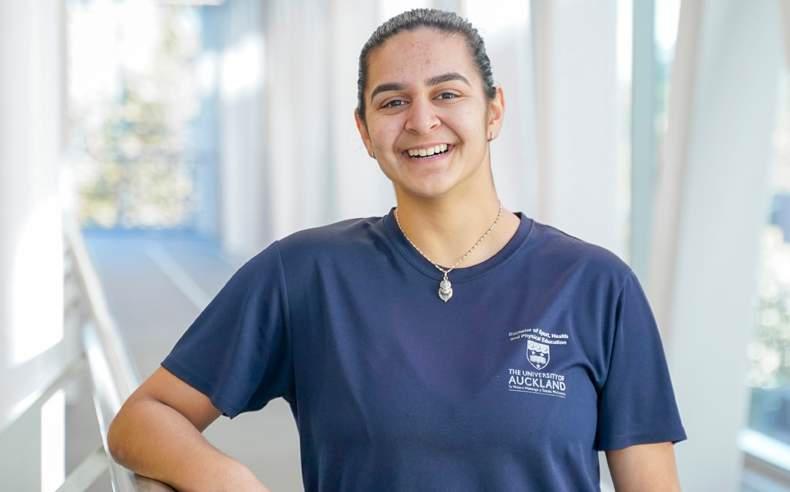
“I’ve always loved being active and have found so much joy, confidence and connection through the communities and people sport brings together,” says 21-year-old ROSHNI OBEROI .
Wanting to help others discover a similar joy –especially those who might not see themselves represented in this space – Roshni enrolled in a Bachelor of Sport, Health and Physical Education (BSportHPE) at the University of Auckland.
“I want to help others build a positive relationship with physical activity and show that anyone can belong in this field, no matter their background,” says Roshni.
Currently in her final year of the degree, Roshni is doing a placement with Disability Sport Auckland (DSA), learning how to modify games and sport to make them accessible to those with disabilities.
When she graduates, she hopes to work in a similar setting, or in a coaching role.
“I currently coach and would love to pursue this further, learning more about how to be a better coach and mentor.”
Over the three-year degree, BSportHPE students can choose from courses focused on coaching, alternative sports, sports media, exercise science,
nutrition, gender, sexuality, Māori movement, dance, youth health – and a range of other topics.
One of the highlights so far for Roshni has been the Māori dance paper, Whakatinanahia, which deepened her understanding of Te Reo Māori and helped bring her class closer together.
“I also really enjoyed teaching and learning cultural games and working in a group to design an initiative that encouraged a targeted minority group to be more active.”
In Year 13 at Avondale College, Roshni took Maths, Geography, Outdoor Education, Wood Technology and Visual Communication and Design. While Outdoor Education gave her experiences and skills that were directly relevant to her degree, she says every subject she took has helped in some way.
“Each one helped me build valuable skills such as communication, critical thinking, and time management.”
Roshni’s advice to school leavers – no matter what path you choose – is to be yourself.
“I know it sounds cliché, but there really isn’t anyone like you. Each individual brings their own flair and personality, and different viewpoints and perspectives is how we are able to challenge our thinking and get better, so never be afraid to be your authentic self and own it.”
■ ROSHNI OBEROI IS ENROLLED IN A BACHELOR OF SPORT, HEALTH AND PHYSICAL EDUCATION AT THE UNIVERSITY OF AUCKLAND
■ SHE IS CURRENTLY DOING A PLACEMENT WITH DISABILITY SPORT AUCKLAND (DSA)
■ IN YEAR 13 AT AVONDALE COLLEGE, ROSHNI TOOK MATHS, GEOGRAPHY, OUTDOOR EDUCATION, WOOD TECHNOLOGY AND VISUAL COMMUNICATION AND DESIGN
photographer ZACH STARK and Physical Education, visit www.auckland.ac.nz/bsporthpe or scan the QR code

Located at the heart of the student precinct, the brand new Hiwa, Recreation Centre offers students the opportunity to nurture lifelong social, physical and mental wellbeing.
Named after Hiwa-i-te-Rangi, the youngest star in the Matariki cluster, Hiwa symbolises aspiration, growth, and ambition – a perfect fit for this vibrant hub for health and community.
All students can become members of Hiwa and take advantage of its incredible facilities, while students enrolled in the Bachelor of Sport, Health and Physical Education also have classes in Hiwa. Facilities include fitness studios, a bouldering wall and an aquatic hall which features a 33x20m pool, spa pool, sauna and dive well with 1m and 3m springboards.
Hiwa boasts a rooftop turf area, outdoor running track and outdoor seating for relaxing or studying. Play football, hockey, tennis, walk or run with epic views of the Sky Tower, Waitematā and Rangitoto.
photograph Sav Schulman
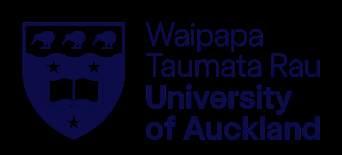
For more information on the University of Auckland’s Bachelor of Sport, Health







EMMA SIMPSON can thank a low-flying bird for getting her into the automotive industry when she was 18.
“My friends and I all bought 90’s beaters for our first cars and would always try to do any work or maintenance ourselves,” she explains.

“So, when a bird took off my wing mirror and I had to get a replacement and paint it the right colour, I did it with help from my grandfather.”
The satisfaction of working on her own car led Emma to an apprenticeship with Auckland Panel and Paint Group, where she completed her New Zealand Certificate in Automotive Refinishing (Level 3 and 4) training in just 17 months – thanks to the support and mentorship she received from her employers and training organisation MITO.
“I learned a lot and was able to progress quickly, thanks to my mentor getting me spraying very early on, instead of holding me back doing apprentice duties.”
Emma’s technical precision, initiative, and leadership potential was recognised at this year’s Collision Repair Association’s Apprentice of the Year Awards, when she was awarded the Golden Gun Award for vehicle refinishing.
“It’s a pretty rewarding feeling getting this award,” says 20-year-old Emma. “I feel like the risk I took in
going into the job with no connections or experience, and all the work I put into finishing my apprenticeship, has paid off.
“I also feel proud to be representing women in the industry and showing that we’re just as competent as men.”
As an automative refinisher, Emma sands, cleans, masks, primes and paints repaired and new car panels.
“I enjoy the feeling when I’ve done a good job on a spray. I also enjoy seeing cool cars come in and getting to drive them 20 metres around the shop.
“The work is a bit repetitive sometimes, so I enjoy when I get to do something a bit different, such as learning a new skill or working on different types of vehicles.”
It can be challenging to get paint jobs perfect, she admits.
“But it’s just a matter of practice and trying to remember previous mistakes and how to fix them if a problem does arise.”
In Year 13 at Long Bay College, Emma took Food Tech, Psychology, History, French and Statistics.
“I wouldn’t say that any of my subjects were geared towards the career I’m in now. I wasn’t expecting to get into a trade and just picked subjects I found enjoyable.”
She says taking more language-based subjects, such as English and History, would have helped with the online learning component of her apprenticeship.
“A lot of it was reading modules of content, comprehending it and turning it into written assessments.”
The secret to succeeding in automotive refinishing is being excited about learning the process and improving – no matter how many mistakes you make, says Emma.
“That’s all it takes to be a good apprentice and excel at what you do.”
Her advice for school-leavers: A trade is the perfect solution if you’re unsure about uni or what you want to do, as you’re paid to learn and it can take you a lot of places.
And it’s a great job for any gender, she adds. “More and more women are joining, which is awesome, because we’re good at it.”
Emma’s goal is to keep learning and maybe someday own her own shop.
“I’d like to do panelbeating one day so I can do the whole repair from start to finish. However, first I’d like to explore the world a bit because this job can truly find you employment anywhere.”

‘‘ I ALSO FEEL PROUD TO BE REPRESENTING WOMEN IN THE INDUSTRY AND SHOWING THAT WE’RE JUST AS COMPETENT AS MEN. ’’
EMMA SIMPSON
EMMA SIMPSON WAS AWARDED THE ‘GOLDEN GUN’ AWARD FOR VEHICLE REFINISHING AT THIS YEAR’S COLLISION REPAIR ASSOCIATION’S APPRENTICE OF THE YEAR AWARDS
SHE HAS COMPLETED HER NEW ZEALAND CERTIFICATE IN AUTOMOTIVE REFINISHING (LEVEL 3 AND 4)


EMMA TOOK FOOD TECH, PSYCHOLOGY, HISTORY, FRENCH AND STATISTICS IN YEAR 13 AT LONG BAY COLLEGE

learn more about careers in the collision repair industry, watch this three-minute video www.collisionrepair.co.nz/careers-video or contact the Collision Repair Association (CRA) for more information www.collisionrepair.co.nz


‘‘I AM MOTIVATED TO KEEP IMPROVING. I DON’T WANT TO BE THAT GUY THAT JUST GETS HIS APPRENTICESHIP AND DOESN’T DO ALL THE EXTRAS. ’’
LACHLAN CHATFIELD

writer PETER WHITE photo NICOLA WILHELMSEN
LACHLAN CHATFIELD admits he did not know what a panel beater was when he was offered an apprenticeship aged 16 with Harrows Collision Repairs in Dunedin. Lachlan was interested in a career as an arborist – after attending a career expo – but when the call came offering the apprenticeship in Year 12 at King’s High School, he jumped at the chance.
“It all happened so quickly. I got a random phone call about a panelbeating apprenticeship opening up at Harrows.
“They asked if I wanted to give it a go. I said yes, then had to ask my mum what a panel beater was,” says Lachlan. “Going from school to work was a lot different.”
The 20-year-old is clearly talented at what he does. The crowning glory came in May when Lachlan won the Collision Repair Association’s (CRA) Apprentice of the Year Award. He won the Golden Hammer Award as the nation’s top collision/ repair apprentice. It is the accolade all apprentices in the industry want to win.
“It means a lot. I never thought I would get it. When I started, I was very, very fresh. I was not into cars at all – I couldn’t even use a screwdriver. I find that some people come into work now and they know my name, because they have seen it in the paper or somewhere else. I am getting bigger jobs at work, too.”
The award competition is made up of four components – application (including employer support), apprenticeship progress, interview, and a practical component designed to showcase the apprentice’s technical skill in real-time. Lachlan scored highly across all four components, but the practical test was what he enjoyed the most.
“Definitely the cutting and welding was the most fun of it for me. The hand-written letters were not really my thing, but I aced it. I have gained a lot more confidence because I did that big test under pressure for the practical component. I feel like, now I can give whatever my best shot.”
Having completed his apprenticeship, Lachlan is now qualified with MITO’s New Zealand Certificate in Collision Repair (Non-Structural Repair) (Level 3 and 4). Next, he is taking on a six-month, level 4 first-line management course –
provided through a MITO scholarship that came with winning the Golden Hammer Award – before he starts his level 5 structural papers.
“I am motivated to keep improving. I don’t want to be that guy that just gets his apprenticeship and doesn’t do all the extras.”
What Lachlan loves most about his job is transforming a damaged vehicle into a totally repaired version, and the variety of work.
“It feels very rewarding. When it comes in all munted – and we do all the work to put it back together and make it look pristine – you feel really good. Every job is different. You are never going to get the same job.”
Lachlan was taking Geography, Outdoor Education, Maths, English, and Earth and Space Science when he left King’s High School in Year 12. He encourages school leavers to consider a career in the collision repair industry as job opportunities are very healthy at the moment.
“Everyone is screaming for panel beaters and car painters. It is a good industry to get into. Everything you do is different and every day you are learning.
“Just listen – that’s the main thing. When you start off and you don’t know what to do, you’re always going to have to ask questions as well, so you need to listen to those answers and then take them on for your next job.”
■ LACHLAN CHATFIELD WON THE GOLDEN HAMMER AWARD IN MAY AS THE NATION’S TOP COLLISION/REPAIR APPRENTICE
■ HE HAS ACHIEVED MITO’s NEW ZEALAND CERTIFICATE IN COLLISION REPAIR (NON-STRUCTURAL REPAIR) (LEVEL 3 AND 4)




■ LACHLAN TOOK GEOGRAPHY, OUTDOOR EDUCATION, MATHS, ENGLISH AND EARTH AND SPACE SCIENCE IN YEAR 12 AT KING’S HIGH SCHOOL
learn more about careers in the collision repair industry




RISHI KHATTAR is passionate about shaping the next generation of young optometrists who will soon start their careers.

Rishi has been working as a Graduate Recruitment Consultant with Specsavers support office since February, after spending three years with the company as a community-based clinic optometrist.
Now, he leads the charge in connecting with University of Auckland students, building relationships, guiding them through clinical placements, and helping them secure their first roles as qualified optometrists.
The University of Auckland is the only tertiary institution in New Zealand to offer an optometry degree.
“This role has pulled me out of the test room and into conversations that genuinely shape people’s futures,” says Rishi.
“It’s not just about talking eye health anymore – it’s about supporting students through every step of the recruitment process, from finding the right practice, to exploring long-term career goals.”

‘‘I WANT TO MAKE SURE THAT EVERYONE WHO JOINS SPECSAVERS HAS THE SAME OPPORTUNITY THAT I HAD. ’’
RISHI KHATTAR



A big part of Rishi’s role is educating students about the Specsavers Graduate Program – a structured two-year journey packed with clinical development, mentoring, and professional support.
He also points graduates in the direction of the Early Career Optometry (ECO) Program, which helps early-career optometrists explore pathways into specialisation, leadership, or even business ownership – opportunities he believes are invaluable for long-term growth.
It is something close to Rishi’s heart as he went through the graduate program himself. Rishi graduated with a Bachelor of Optometry and Vision Science (BOptom, Hons) – and prior to that he did a Bachelor of Biomedical Sciences (BBiomedSc) at the University of Otago.
“I want to make sure that everyone who joins Specsavers has the same opportunity that I had.”
Rishi says that no two days are the same with this role.
“I love the variety from sitting down with students on campus to jumping into recruitment strategy
sessions. It’s fast-paced, it’s people-focused, and I’m constantly learning new skills outside of clinical practice.”
Rishi still holds his practising licence – he plans to practise when the time allows – and enjoys working in a clinical setting.
He says the combination of science, healthcare and inter-personal connection drew him into the career.
“I feel I am pretty passionate about helping people. Optometry allows you to make a real and measurable difference in people’s daily lives.
“A simple pair of glasses can make a whole world of difference.”
Sometimes an optometrist has to give a difficult diagnosis to a patient.
Rishi says it is all about providing that reassurance, patient education and a strong focus on early detection.
He sees those same communication skills as vital to the recruitment world too.
Of the subjects he took in Year 13 at Hamilton Boys’ High School – Physics, Chemistry, Calculus, Statistics and Photography – Rishi says Physics and Chemistry were most important to setting him up for his optometry career.
The key responsibilities of an optometrist are to conduct comprehensive eye examinations, diagnose eye and vision conditions, and develop tailored treatment plans to support patients’ visual and ocular health.
Rishi’s key piece of advice to school leavers interested in optometry as a career – you need to be an effective communicator.
“Dealing with patients, you are telling them something about their health, so it is so crucial to communicate clearly and with empathy. But it’s not just about patients – being able to communicate well with peers, mentors and colleagues is just as important.
“The best optometrists aren’t just clinically excellent – they’re adaptable, curious, and strong team players who are always willing to learn.”



It’s the feeling of





(and your people)

At Specsavers, a career in optometry isn’t just about eyes — it’s about people. It’s about discovering what you’re capable of and growing your way, with support, purpose, and a path that’s yours to define.
When you become an optometrist with Specsavers, you’re joining a community that’s passionate, progressive, and built around helping others — including you.
Join a profession with purpose, a path with potential, and a team that feels like family.

What 19-year-old ETHAN DEVERY loves most about being a Fonterra apprentice is the work environment and the opportunities the company has given him.


“Fonterra will do everything to help me get every qualification I need for my job and all the training. I also like how I was put into a small work group of four technicians and I learn from every single one of them,” says Ethan. “It helps me find stuff that I can do and that works for me.”
Ethan is nearly halfway through his four-year apprenticeship that leads to a New Zealand Certificate in Heavy Automotive Engineering – Diesel/Automotive (Level 4) qualification.
He is based at Fonterra’s milk processing plant in Longburn, near Palmerston North, and primarily works on the milk tanker fleet.
“What I like about working with trucks is how it is a completely different ball game compared to cars. There is different technology and the trucks are all diesels. Everything is much, much bigger which is probably the hardest difficulty to overcome for me.”
Ethan is of Ngāti Parau and Ngāti Whātua descent. He did a year’s pre-trade course at UCOL, Palmerston North, before landing his apprenticeship with Fonterra.
He is grateful for the assistance given to him by the Māori and Pasifika Trades Training (MPTT).
“MPTT sponsored me through UCOL. They are great. They supplied me with all my tools and PPE, and funded my petrol to travel from Levin where I live. If people get a chance to get in with them, they are amazing.”
Fonterra is renowned for offering diversity within their early career programme. Ethan says there are so many opportunities and career paths available to everyone once you join the company.
“Fonterra is based on values that I believe Māori believe in, such as looking after the land and looking after the people. That is what really drove me into wanting to work with this company. Their values align with how I was raised, especially when it comes to whakapapa around Māori culture.
“I love that at Fonterra I'm celebrated for being who I am as Māori.”
Ethan attended Waiopehu College in Levin. In his last year (Year 12) he took English, Maths, PE, Metalworking and Woodworking. At that time, he wanted to be a truck driver but then had a change of heart.
“That was my first plan because I come from a family of truck drivers. My father and my brother were drivers in the army but what changed my mind was I wanted to do something different.
“We had no tradesmen in the family so I thought it was something I wanted to do. I did take a lot of interest in being hands-on, so that is what persuaded me to go towards the automotive trade.”
Ethan recommends doing an apprenticeship through Fonterra as there are so many career opportunities available.
“When it comes to Fonterra apprenticeships, they will give you the best that the industry can offer. They will teach you everything you could possibly need to know – no matter what type of trade it is.”





‘‘ YOU GET OUT OF IT WHAT YOU PUT IN. THERE ARE GOOD CAREER OPPORTUNITIES. ’’
BROOKE ELLIS

BROOKE ELLIS completed her Electrical and Instrumentation apprenticeship with Fonterra late last year – in just two and a half years.
Brooke (26) is the only female tradie working on the large manufacturing site at Maungaturoto in Northland.
“It is good to be out of my apprenticeship. I completed both my Electrical and Instrumentation so have a dual qualification, which comes in quite handy for work,” says Brooke.
“We do a lot of work on instruments at Fonterra, working on equipment such as pressures, temperatures and conductivity. We make milk powder, whey and casein at Maungaturoto.”
The variety of work is one of the aspects Brooke loves about her role.
“In my day-to-day, I can go from fixing a light, to fault-finding a process issue, to doing calibrations – which is why I was drawn to working for Fonterra.
“I’ve never been attracted to a job that requires sitting still all day. I enjoy being active, getting outdoors and engaging with plant operators to establish a strong connection.’’
writer PETER WHITE photography PAULA McINNES
Brooke’s role is quite different to that of an electrician who works on residential properties.
“We are maintenance electricians and maintenance fitters on-site, not installation based. We do a lot of basic maintenance to prevent breakdowns, while an electrician goes to someone’s house to repair something that is already broken.
“We learn a lot about how the process works so when there are breakdowns and we are fault-finding, we have a pretty good understanding of what is supposed to be happening.”
Brooke appreciates the level of support she has received since she started working for Fonterra.
“Everyone has been welcoming. Fonterra are so supportive. If there is any training or further development you want to do, they are very encouraging of that.
“You get out of it what you put in. There are good career opportunities.”
Brooke would like to see more young women get into the trades if it is the right choice for them.
“It is not for everyone but if anyone is interested, I am happy to have that conversation with them.”
In Year 13 at Whangārei Girls’ High School, Brooke took Physics, Calculus, PE, History and English.
She was not sure what she wanted to do as a career when she left school, but says the science subjects directed her towards her current role.
Brooke took advantage of the excellent apprenticeship programmes run by Fonterra.
Her timing was good as there was a vacancy at the time she applied.
For school leavers with a desire to get into the trades, Brooke recommends following the Fonterra website for opportunities to apply for apprenticeships in different areas.
Once you leave school and start a trade, having a good attitude is number one on her list of things to have.
“Showing up on time, doing your best and also doing what you are told, are important.
“The type of environment you are in can be quite unfamiliar so take the lead from someone more senior than you while you are learning.”
■ BROOKE ELLIS COMPLETED HER ELECTRICIAN AND INSTRUMENTATION APPRENTICESHIP WITH FONTERRA LATE LAST YEAR
■ SHE IS THE ONLY FEMALE TRADIE WORKING AT FONTERRA’S MANUFACTURING SITE AT MAUNGATUROTO IN NORTHLAND
■ IN YEAR 13 AT WHANGĀREI GIRLS’ HIGH SCHOOL, BROOKE TOOK PHYSICS, CALCULUS, PE, HISTORY AND ENGLISH










Check out this new website which includes over 800 career ideas and 4,000 qualifications and courses available throughout the country.
www.tahatu.govt.nz
Obstacles don’t have to stop you. If you run into a wall, don’t turn around and give up. Figure out how to climb it, go through it or work around it.
Michael Jordan (NBA star)



Term 3 holiday 2025: 19 September– 6 October 2025
Term 4 holiday 2025: No later than 19 December 2025 through to no earlier than 27 January 2026
Term 1 holiday 2026: 2 April –20 April 2026
Term 2 holiday 2026: 3 July –20 July 2026
Information sourced from Ministry of Education, visit www.education.govt.nz

www.massey.ac.nz
www.auckland.ac.nz
www.aut.ac.nz



* Accurate at time of print. Please check providers’ websites for any changes. If you don’t work on your dreams, you’ll always work on someone else’s dreams. Warren Buffett (American investor and philanthropist) You never know how
Bob Marley (singer/songwriter)




Leaving school is one of the biggest transitions we make in our lives, and it’s a time when anxiety, worry and depression can surface. www.thelowdown.co.nz is full of ideas and people who can help you get unstuck and get to a better place. Need to talk? Free text to 1737

These websites will help you find a job!
Allied Work Force – www.awf.co.nz
Millions of dollars are available and applications close

Trade Me Jobs – www.trademe.co.nz/jobs
JobSpace – jobspace.co.nz
Student Job Search – www.sjs.co.nz








If you are about to leave school and you’re looking at tertiary study, there’s going to be a lot to think about. If it’s anything to do with financial support




The greatest leaders are not necessarily the ones who do the greatest things. They are the ones that inspire others to do great things.
Ronald Reagan (40th US President)



Tuesday 4 November
Visit…
www2.nzqa.govt.nz/ncea for everything you need to know about the 2025 exams and timetable

opportunities to develop your skills in new and interesting ways as well as providing valuable real-world experiences – all important attributes to your CV when applying for your first job!
For more information, visit: www.volunteeringnz.org.nz/ volunteers/finding-volunteer-roles/




It’s always important to make sure that you are on the electoral roll and ready to take part in national and local elections. How else can you be sure that you are ready to have your say on the big issues affecting you and your family? vote.nz


If you are thinking about studying at one of the eight universities in New Zealand in 2026 visit: www.thinkingaboutuni.nz which has all the information at your fingertips.



LIFELINE available 24/7
0800 543 354 www.lifeline.org.nz
YOUTHLINE available 24/7
0800 376 633 or free text 234 www.youthline.co.nz
WHAT’S UP? available 24/7
0800 942 8787 www.whatsup.co.nz
ALCOHOL DRUG HELPLINE
0800 787 797 available 24/7 www.alcoholdrughelp.org.nz











Visit www.keytolife.org.nz





Failure is a great teacher and, if you are open to it, every mistake has a lesson to offer.
Oprah Winfrey (American Author and



Winston Churchill (Former Prime Minister of the United Kingdom)











If you are planning on taking a GAP Year or studying abroad visit: www.afs.org.nz or for more information call 0800 600 300










Apprentice builder TIM HAYES believes in having pride in his work. His aim for perfection played a key role in him participating in the Apprentice of the Year Challenge held in June.

Tim (24) works for CoBuild in Whangārei. He is rightly proud to have been selected for the sought-after event.
It is a reflection of how highly he values the work he has done over nearly four years as an apprentice.
“I love being able to see something from start to finish. I also enjoy what I do, so it becomes not really like going to work but something you enjoy doing with your mates,” says Tim.
“Finishing lines are for me the best part of the job. Things like architraves and reveals around windows, the skirting boards, and all the finer details –basically the last thing that anyone will see on a building.
“That is where your workmanship shines. I want to leave a job knowing I have done it properly.”
Tim went to Whangārei Boys’ High School. In Year 13 he took Classics, Science, Maths, Social Studies and Economics. At that stage he was not sure what he wanted to do for a career but knew it had to involve working outdoors.
After a stint employed keeping the grounds tidy at a retirement village alongside his father, he stumbled upon the chance to get a building apprenticeship in Whangārei.
“I knew trades was there as an option and everyone seemed to point me in that direction. I went to a one-day, pre-trades course, and the next day I got a phone call from a building company asking if I wanted to start working for them. It all started from there.”
Tim started his apprenticeship through Builders Academy, whose mission is to help apprentices get better with effective regular support.
writer PETER WHITE photographer PAULA M c INNES

“It has been awesome. Builders Academy have really looked after me and essentially pushed me to do the competition I am in. Without them, I probably would not be doing it.
“They are more switched on. They are willing to come and see you and to message you anytime you need them. They are really there for you.
‘‘ANYONE CAN BECOME A BUILDER WITH THE RIGHT ATTITUDE. BEING WILLING TO LEARN AND PUT IN THE TIME AND EFFORT ARE THE KEY THINGS. ’’
“The apprenticeship has given me so much confidence, as I didn’t really have much confidence growing up. I have learned how to deal with older guys who have essentially become life-long friends.”
The construction industry is always looking for new tradies to join them. Tim recommends school leavers consider taking up an apprenticeship like he did.
“There is a lot of work out there but it is important you find the right company that fits with you.
“Anyone can become a builder with the right attitude. Being willing to learn and put in the

time and effort are the key things. You need to be clean and tidy, be able to take in information given to you and you also need to be on time for work.
“If you make a mistake, then own up to it, and ask questions if you don’t know something. It is worth it in the end.”
■ TIM HAYES IS AN APPRENTICE BUILDER FOR COBUILD IN WHANGĀREI
■ HE STARTED HIS APPRENTICESHIP THROUGH BUILDERS ACADEMY
■ TIM SAYS THE CONSTRUCTION INDUSTRY IS ALWAYS LOOKING FOR NEW TRADIES TO JOIN THEM
■ IN YEAR 13 AT WHANGĀREI BOYS’ HIGH SCHOOL, TIM TOOK CLASSICS, SCIENCE, MATHS, SOCIAL STUDIES AND ECONOMICS
For more information on apprenticeships through Builders Academy, visit www.buildersacademy.co.nz





From being a voluntary firefighter in Hokitika, to working for a Chartered Accounting company in Christchurch, is all part of LOGAN KEENAN’s journey.

Logan grew up on the West Coast and spent seven years working for Cuffs Chartered Accountants and Business Advisors in Hokitika. During that time, he served as a voluntary firefighter.
By a stroke of good fortune, his boss at work just happened to be the deputy fire chief during that time.
“He basically covered my wages while I was out on calls. We both went out together. It was great to be able to develop some other skills outside of accounting,” says Logan.
“You get less exposure to larger companies working for a smaller firm but in some ways, you get more
‘‘ I REALLY ENJOY THE PEOPLE SIDE OF IT THE MOST. I DON’T THINK I WOULD GET AS MUCH REWARD OUT OF IT IF I WAS JUST BEHIND A DESK ALL DAY. ’’
variety, because you deal with different aspects like the administration side that you would not in a larger firm.”
Logan works as an Auditor for Nexia New Zealand in Christchurch. He is a qualified Accounting Technician, experienced in preparing special purpose financial reports, income tax returns and GST returns, and is highly proficient with Xero, MYOB Essentials and Microsoft Excel.
Attaining his Graduate Diploma in Chartered Accounting from Chartered Accountants Australia and New Zealand (CAANZ) is a key goal he is working towards.
“I have just started the CA program so I have basically another two years before I get the CA designation, all going well. It is an important step.

Explore the accounting and finance world and receive valuable information and resources to broaden your skills and understanding. You will be invited to networking and careers events and have access to exclusive employment opportunities. What are you waiting for? Sign up to be a Chartered Accountants ANZ student member today.

■ LOGAN KEENAN IS AN AUDITOR WITH NEXIA NEW ZEALAND IN CHRISTCHURCH
■ HE IS A QUALIFIED ACCOUNTING TECHNICIAN AND IS WORKING TOWARDS HIS GRADUATE DIPLOMA IN CHARTERED ACCOUNTING
It is not just financial but the experience you gain from going through the CA program, and it is a credibility thing as well.”
During his time working for Cuffs in Hokitika, Logan was doing more of the preparation side of accounts. His motivation for shifting to Christchurch was to step out of his comfort zone and try something different.
“As an auditor, you need a different set of skills. You get to go out in the field, spend time in businesses and meet all the key personnel involved in the businesses.
“You get a good feel for how things are run rather than just looking at a set of reports. It is much more people-focused.
“It is putting into context some of the work you do as an accountant and getting more of an intuitive feel for how things are run.”
Logan is passionate about getting it right for the client and making a difference for them.
He says accounting is full of technical jargon so it is important to be able to translate complex things into easy-to-understand language.
“I really enjoy the people side of it the most. I don’t think I would get as much reward out of it if I was just behind a desk all day.”
Logan finished off the last two years of his Bachelor of Commerce (BCom) in Taxation and Accounting at the University of Canterbury, after doing the first stages by distance learning through Massey University.
In Year 13 at Westland High School, Logan took Biology, Chemistry, Physics, Calculus and Statistics. He then spent two years working for a milk processing company as a micro-biology lab technician, before an advert for an accounting apprenticeship grabbed his attention.
“It was an opportunity to work full-time and study part-time through Massey University. I did that for five years before shifting to Canterbury for the final two years.”
Logan’s advice to anyone keen on a career in accounting – the most important thing in the profession is to have really good communication skills.
“It is just as important as the technical side.”
■ LOGAN SPENT FIVE YEARS AS A VOLUNTARY FIREFIGHTER IN HOKITIKA
■ IN YEAR 13 AT WESTLAND HIGH SCHOOL, LOGAN TOOK BIOLOGY, CHEMISTRY, PHYSICS, CALCULUS AND STATISTICS



SARAH O’CONNOR works as a systems accountant with the Treasury in Wellington – but she wanted to be a surgeon when she finished Year 13 at Wellington Girls’ College. The pathway to making such a huge career change included attending Northern Arizona University on a swimming scholarship.
Sarah (26) gained a bachelor’s degree there in Biomedical Sciences, majoring in Chemistry and Psychology, before moving back to Wellington, where she added a Master of Professional Accounting (MPA) from Victoria University.
“Through high school, I wanted to be a surgeon – so I did all the science related subjects like Physics, Chemistry and Biology (in Year 13) to set myself up for that,” says Sarah.
“I was also a competitive swimmer and had a goal to get a scholarship to a university in America. I achieved that and that’s how I ended up at Northern Arizona University.”
In 2020, due to Covid, Sarah returned to New Zealand and finished her degree online. She started working in accounts administration and discovered a new interest – one that shifted her career goals away from medical school.
“I realised I was more interested in this type of work, so I went back to university to study my Master of Professional Accounting at Victoria University. I’m now working through the Chartered Accountant (CA) program to become fully qualified.”
Sarah spent more than two years as a junior systems accountant at the Treasury, before moving into her current role as a systems accountant in November last year.
Prior to working for the Treasury, Sarah had other public sector roles with the Department of Internal Affairs and Inland Revenue.
“A systems accountant helps make sure the finance system a business uses is working properly and does what it needs to do – like tracking money, creating reports, with things running smoothly behind the scenes,” she says.
“We understand both the accounting side of things and the technology side of things.”
Working at the Treasury is a specialised role that gives Sarah an inside view of some of the key
strategic financial reporting – including the Budget that is presented by the Minister of Finance.
“The system’s main purpose is to produce things like the financial statements of the government and the Budget.
“That’s always a really busy time for us, making sure everything is working correctly and the data is accurate. Our system is fully built in-house at the Treasury.
“We have a team of systems accountants and developers who built this system, which is used by government departments and other government reporting agencies to submit their financial data.”
Sarah’s day-to-day role is varied, but usually involves helping people use the system, make improvements and fix any issues that pop up.
“It is really interesting because no two days are the same. We will be developing new functionality,
making the system easier to use while also fixing any bugs that come up.
“My role allows me to be creative and to think of new ideas to make the system better. It’s really cool to see these ideas come to life.”
Sarah says there are many facets to being an accountant and wide-ranging career options available.
“There are so many different areas you can go into. I like that even though accountants are essential to every business, the work isn’t always just about numbers.
“Anyone can become an accountant if they are willing to learn and give opportunities a go. As you grow and experience new things, your interests might change and that’s completely fine.
“There is no one right path for anyone. It’s about discovering what you enjoy and building your own journey.”
Explore the accounting and finance world and receive valuable information and resources to broaden your skills and understanding. You will be invited to networking and careers events and have access to exclusive employment opportunities. What are you waiting for? Sign up to be a Chartered Accountants ANZ student member today.




‘‘ ANYONE CAN BECOME AN ACCOUNTANT IF THEY ARE WILLING TO LEARN AND GIVE OPPORTUNITIES A GO. ’’ SARAH O’CONNOR





Unitec prides itself on providing learning pathways for students – something JESSICA TREGIDGA experienced firsthand six years ago.

When she didn’t get the points she needed to enrol directly in an architecture degree from school, staff at Unitec worked with Jessica to put together a study plan to help her achieve her dream of becoming an architect.
“Their support is ultimately what made me want to continue studying there for my bachelor’s degree and my master’s degree,” says Jessica.
A two-year Diploma in Architectural Technology set Jessica up with a solid foundation in architecture.
“It taught me drawing skills, with both manual graphic drawing and CAD programs, as well as how to search and use NZ legislations and codes to accurately prepare drawings for building construction outputs.”
The diploma also allowed her to cross-credit 90 points to the Bachelor of Architectural Studies, which meant she had six fewer papers to complete for her degree.
Now 24, Jessica is working towards a Master of Architecture (Professional) through Unitec, which she hopes to complete by the end of this year.
“The people I have met have been some of the best and the overall community created at Unitec is amazing.”
Once she completes her master’s, Jessica’s next big goal is to become a registered architect. Architecture graduates need to complete two to three years of on-the-job practical work experience before they can apply to become a registered architect.
“Career-wise, having a master's degree in architecture essentially speeds up the registration process. Being registered means that you have proven you’re capable of running your own projects.
“Personally, this has been a goal for me since I began studying, so it has a very fulfilling aspect to it as well.”
While she is completing her master’s thesis, Jessica is working as an architectural graduate at Architects H+K in Whangārei.
“My job involves drawing/modelling architectural projects and providing drawings – from the concept through to the detailed drawings – for the project's lead architect. I also do some of the project renders, which visualise what the project will look like for the client.
“I enjoy the variety. Every job is different and has different challenges to resolve. I also enjoy watching

“I didn’t just find a career path... I found confidence, purpose, and a reason to believe in myself.”
a drawn project become a fully constructed building that people can enjoy.”
During her time at Unitec, Jessica has worked in a variety of student support roles, including as a tutorial assistant, teaching classes, marking work and providing support to students.
As well as being a welcome source of income, Jessica says tutoring helped to reinforce her own learning.
“I found that having to explain concepts or information in a way that another student would understand, made me understand it better and kept the information that I had already learnt at the forefront of my mind.
“In some classes, the students that I’ve helped have ended up teaching me new things as well.”
In her final year at Dargaville High School, Jessica took Physics, English, Calculus, Accounting, and Design and Visual Communication (DVC).
She says DVC was the most useful subject because it introduced drawing to scale and different architectural drawing views.
Calculus was also helpful for learning how to use different formulas to work out measurements.
I didn’t know what was next... Now I’m living a life I’m proud of!
After finishing school with NCEA Level 2, Alex felt lost. Learning difficulties, anxiety, and the sudden end of a part-time job left them isolated and unsure of the future.
That changed when they joined the Career Navigator programme at school. With the support of tutors and mentors, Alex began to rebuild confidence, develop new skills, and realise their potential.
“I went from thinking ‘I can’t do this’ to ‘I can’t do this yet.’ Career Navigator helped me realise I’m a worthwhile person with something to offer.”
Today, Alex is working in a job they love, performing as a DJ, and even acting in local theatre. Their journey is a testament to what’s possible when young people are supported to find their path.
Career Navigator supports young people into further education or career options through mentorship workshops and exposure to jobs and workplace opportunities.
Find out more about the positiive impact of the Graeme Dingle Foundation’s youth development programmes Kiwi Can, Stars, Career Navigator & Project K by visiting www.dinglefoundation.org.nz
If you are thinking about studying architecture, be aware that it is a challenging and time-consuming degree, says Jessica, but also a very rewarding one.
“You get to create these very complex and beautiful buildings that people get to use and hopefully really like.
“Architecture can also lead to a lot of different career possibilities and it can take you anywhere in the world.”

‘‘ THE PEOPLE I HAVE MET HAVE BEEN SOME OF THE BEST AND THE OVERALL COMMUNITY CREATED AT UNITEC IS AMAZING. ’’
■ JESSICA TREGIDGA HAS NEARLY COMPLETED A MASTER OF ARCHITECTURE (PROFESSIONAL) THROUGH UNITEC
■ SHE IS WORKING AS AN ARCHITECTURAL GRADUATE AT ARCHITECTS H+K IN WHANGĀREI
■ IN YEAR 13 AT DARGAVILLE HIGH SCHOOL, JESSICA TOOK PHYSICS, ENGLISH, CALCULUS, ACCOUNTING AND DESIGN AND VISUAL COMMUNICATION (DVC)

For more information on studying Architecture at Unitec , visit
www.unitec.ac.nz/architecture
For a first-hand look, get along to the Unitec Open Day on Saturday, 6 September.








writer SARA CARBERY // photographer ZACH STARK
Although she’s only 25, ISABELLA McLEAY can already look back on an interesting and varied career, thanks to a Bachelor of Commerce and Science from the University of Otago, majoring in Consumer Food Science and Marketing.

Isabella’s first job out of university was working as a marketing intern at an agency, followed by a marketing assistant role at a chocolate company, where she gained a solid understanding of how brands operate and market themselves.
From there she moved into media and communications at a large media agency, working with big brands like TVNZ and Woolworths.
“This role was a great mix of working with data, budgets and planning while also being very social and collaborative – which suited me perfectly,” says Isabella.
In her current role as a portfolio activation assistant with Mars NZ, Isabella helps to launch new products, develop in-store campaigns and displays, and bring brands to life through events and retail activations.
“It feels like I’ve found the perfect blend of everything I’m passionate about – food, people, creativity, and strategy.”
The part of the job she finds most interesting is understanding consumer behaviour – what motivates people, what catches their eye, and how they can use insights to influence their choices.
“It’s fascinating and always evolving.”
Deciding where to go to university was easy for Isabella – her parents met at the University of Otago and her older sister went there too.
“So, it felt like a rite of passage for me to head down there. I was also really drawn to the vibrant student culture in Dunedin. There’s something really special about a town built around its university.”
But like many school leavers, she wasn’t entirely sure what she wanted to study – “and definitely not what kind of job I wanted”.
After initially enrolling to study psychology and marketing within a Bachelor of Applied Science, Isabella discovered the Consumer Food Science degree in her first week of uni “and something clicked”.
“I’ve always been a passionate foodie, and the intersection of food, consumer behaviour and marketing immediately sparked my interest, and I never looked back. It’s all about figuring out what plays to your unique strengths and interests. There really is something out there for everyone.”
In her third year of study, the university introduced the Bachelor of Commerce and Science, which combines business and science in one degree.
“It felt like a perfect fit for the hybrid path I was already on. I transferred into that program and found the addition of core commerce papers gave me a broader and more practical understanding of the business world – something I really valued.”
In Year 13 at Diocesan School for Girls in Auckland, Isabella took Biology, Chemistry, Geography, History and Mathematics with Statistics. Statistics is helpful in her current role, for analysing data, interpreting consumer insights, and making statistically informed decisions to drive successful marketing strategies.

‘‘ I WAS ALSO REALLY DRAWN TO THE VIBRANT STUDENT CULTURE IN DUNEDIN.’’ ISABELLA M c LEAY
Although English was her least favourite subject in Year 12, Isabella says it taught her valuable communication skills.
“So much of my job now involves writing, presenting and clearly expressing ideas – skills developed in those English classes.”
Her advice to school leavers is to be open and flexible.
“You don’t need to have everything figured out straight away – I certainly didn’t. Say yes to new opportunities, even if they feel a little outside your comfort zone because that’s often where the biggest growth happens.
“You won’t know what you enjoy until you give it a go – and there’s no shame in changing direction as you learn more about what lights you up.”
For more information on studying at the University of Otago (Bachelor of Commerce and Science), visit www.otago.ac.nz/courses/ qualifications/bcomsc




Your home away from home.
Leaving home is a big step and finding the right accommodation can make a real difference when it comes to settling in and finding your feet.
Most first-year students live in one of our 15 residential colleges, which are located on or close to campus. More than just a room, each college offers three catered meals a day, a strong support network, and a lively social calendar.
You’ll be part of a tight-knit community from the day you arrive, making it easy to meet new people, build lifelong friendships, and transition to student life.
Take a look at the key dates and information you’ll need.
Applications open 1 August
Apply before 30 September, for selection on 1 October
In early October, you’ll either be offered a place or advised you’re on the waitlist
Applications submitted after 1 October will be considered if places become available






writer SARA CARBERY photographer NICOLA WILHELMSEN
“Have an idea what you want to do but keep an open mind and don’t be worried about changing halfway through,” says honours student GRACE SCOTT, when asked what advice she has for school leavers starting university.
Grace’s mum and dad are both doctors and she enrolled in health sciences first year (HSFY) at the University of Otago, thinking she would follow in their footsteps.
“But half-way through first year I realised I didn’t want to do medicine. I discovered I was more interested in the development side of things, rather than the diagnostic side.”
So, she transferred to a Bachelor of Biomedical Sciences (BBiomedSc) at the end of her first year, combining physiology and pharmacology to graduate last year with a major in Drugs and Human Health.
Biomedical science is the study of the human body, from what’s happening in the individual cells right through to the whole body, and how diseases are diagnosed and treated.
Interested in how drugs treat diseases and what developments are coming in this area, Grace (21) is currently working on her post-graduate thesis, which she hopes to finish in October.
Most of her days are spent in the laboratory, working with her supervisor to develop a drug to protect the heart during heart surgery.
“Anyone who has watched Grey’s Anatomy will know that when you operate on the heart there is no oxygen supply, so the heart dies a little bit. We are trying to stop this from happening.”
In their first year, BBiomedSc students study first year health sciences. After this, they get to choose from one of six majors – drugs and human health, functional human biology, infection and immunity, molecular basis of health and disease, nutrition and metabolism in human health, or reproduction, genetics and development.
These majors contain a wide range of subjects and can be tailored to students’ interests.
“There is a lot of flexibility in the degree. You can dabble in a lot of different areas which was really
appealing because I didn’t entirely know which specification I wanted to go into.”
In her final years at Bethlehem College, Grace took History, Physics, Biology, Chemistry, Statistics and Calculus to Level 3. (Taking Chemistry and Biology is recommended.)
She says Physical Education and Nutrition/Health would also be helpful.
Otago University’s School of Biomedical Sciences prides itself on employing researchers who are at the forefront of their field, and Grace cites the quality of the teaching staff as one of the highlights of her degree.
“There are several biomedical departments: one of the department leaders, who is now my supervisor, is super engaged.”
Non-academically, Grace says the city’s student lifestyle was a huge drawcard to study in Dunedin.
“It’s a really supportive, fun lifestyle – everything is catered to students, and you’re surrounded by people who are all doing the same thing.
“It was fun being away from home and meeting new people,” she says of her first year in halls.
“I highly recommend it.”
Her advice is to be excited about starting university but don’t be disappointed if it’s not full-on fun and harder than you expected.
“People put themselves under pressure to come and have the best time of their life.
“Personally, for me, first year was more hard than fun. And that’s ok – that happens to a lot of people.”
In October, Grace plans to move to Sydney and has already put her feelers out for work. “I’m not entirely sure what that will look like but it will probably be in the pharmaceutical or med-tech industry working to find new products.”

‘‘ THERE ARE SEVERAL BIOMEDICAL DEPARTMENTS: ONE OF THE DEPARTMENT LEADERS, WHO IS NOW MY SUPERVISOR, IS SUPER ENGAGED. ’’ GRACE SCOTT
■ GRACE SCOTT HAS A BACHELOR OF BIOMEDICAL SCIENCES MAJORING IN DRUGS AND HUMAN HEALTH FROM THE UNIVERSITY OF OTAGO
■ SHE IS CURRENTLY WORKING ON HER POST-GRADUATE THESIS, WHICH SHE HOPES TO FINISH IN OCTOBER
■ GRACE TOOK HISTORY, PHYSICS, BIOLOGY, CHEMISTRY, STATISTICS AND CALCULUS TO LEVEL 3 AT BETHLEHEM COLLEGE




writer PETER WHITE // photo by THOMAS GREENAWAY
GABE ROSS is the co-founder of Weekend Mish, a multimedia brand redefining how young people engage with the outdoors. He uses a unique combination of fast-paced, adventure storytelling – centred on conservation-driven hunting, fishing and spearfishing.
Gabe (22) started Weekend Mish in Year 12 at John McGlashan College in Dunedin – but it was not until 2023 that he and business partner Riley Mason turned it in to a fulltime occupation. That came after their skills were put to the ultimate test on Discovery Warner Brothers’ Great Southern survival show Tracked, which they won.
“I am still incredibly grateful for the opportunity to be part of it,” says Gabe. “It was a really, really awesome learning experience and taught us a lot of lessons, but honestly it was a lot of fun.”
A key stage in Gabe progressing his business came when he enrolled at Otago University’s Business School to do a Bachelor of Entrepreneurship (BEntr).
“I really enjoyed the four years I did in Dunedin. The course was excellent but it really is what you make of it. If you are eager to learn and soak up a lot of information, then there is a huge amount of opportunity there to really grow and use the resources that the course has available.
“There was a lot of variety and skill sets. That entrepreneur course fitted what I wanted to do perfectly. I didn’t want to specifically specialise in some of the other courses, such as marketing or management or economics. For me, I really wanted to understand how to conceptualise, grow and found a business from start to finish.
“That course really helped me understand how that works.”
Gabe is based in the glorious setting of Lake Hawea Station in Central Otago – but spent his first 14 years living in Auckland. It was there he first caught the outdoors bug. When his family moved down south, he fell in love with all the wonderful opportunities available in the natural world.
“My dad is a great spear fisherman and he introduced us to the outdoors at a very early age, which encouraged my passion for all the other activities in the outdoors like hunting, fishing, diving and skiing.”
Gabe’s overriding passion is to show how the outdoors is empowering for everyone and to promote sustainability.



‘‘ I REALLY ENJOYED THE FOUR YEARS I DID IN DUNEDIN. THE COURSE WAS EXCELLENT BUT IT REALLY IS WHAT YOU MAKE OF IT.’’ GABE ROSS
“A huge amount of our audience aren’t into the great outdoors but they are looking to get into it, so that is kind of the goal of what we are doing – to inspire others to go out and embrace the outdoors and maybe find some new passions.
“It doesn’t have to be in our niche of hunting, fishing, diving. It could be hiking or tramping or gravel biking – anything that gets people into the outdoors.
“It is positive for your fitness but also positive for your mental health as well. Just enjoying nature and having a wider appreciation for it.”
Social media has been pivotal to the success and spread of Weekend Mish. Gabe says from a very young age, he wanted to figure out a way to monetise his greatest passions.
Gabe is certainly a young man of many talents. He played cricket for Otago under-19s, is a published writer for multiple outdoor publications, a PADI certified diver and competitive free diver, and he is certified to Grade 8 in Speech and Drama through the Trinity School of London.
In Year 13 at John McGlashan College, Gabe took Maths, English, PE, Technology, Photography and Religious Education. He would love all school leavers to embrace the outdoors and have pride in having respect for nature.
“Just get out there and develop that passion for the outdoors.”





writer DIANA CLEMENT photograph i STOCK

Student loans feel like free money, until they don’t. The money can be a lifesaver when you’re studying, but it’s not a gift. It’s debt, and it sticks around. Here’s what to know before you borrow a cent.
What is a student loan?
Even if you don’t qualify for a student allowance, most students can borrow their tuition fees – up to $1,000 for course-related costs, and $323.43 a week for living expenses from StudyLink. Tuition fees are paid directly to your provider, while the rest goes into your bank account weekly.
It can feel like Christmas when the payments drop but it’s debt, not free money. Knowing how it works can help you avoid the common traps.
The “Interest-free” myth (and the reality)
Every dollar you borrow must be paid back. If you don’t finish your course and don’t get a qualification, you’ll still have to pay back the loan.
It’s interest free if you work in New Zealand. If you leave the country on an OE of more than six months, you’ll pay interest, which increases the debt fast.
Understanding the repayment process
Repaying your student loan is generally pretty simple. Once you’re earning more than $24,128 a year, 12% of what you earn comes out of your pay automatically. You can make extra repayments any time you want if you want to pay your loan off faster.
Common pitfalls to avoid. You don’t want to build up more debt than necessary. So, watch out for these traps:
1. Don’t borrow more than you need. It’s tempting to take the full amount and splash out, but ask yourself – how much is going to your studies versus your lifestyle?
● No-nonsense advice. Sort a basic budget to make your money go further. Can you pick up part-time work to cut costs? Living at home saves a lot, if you can.
2. Keep an eye on your outstanding balance. Always knowing how much you owe can help you manage it better.
● No-nonsense advice. Log into Inland Revenue’s MyIR regularly to see how you’re doing. It makes a difference.
3. Don’t ghost your loan if you go overseas: If you move overseas for more than six months, you’ll pay interest on your loan. If you stop your repayments your loan balance will grow bigger with interest and possibly fines. Don’t ignore it.
● No-nonsense advice: Contact Inland Revenue before you go and set up a repayment plan.
4. Watch out for other debt. Loading up on credit cards, personal loans or buy-nowpay-later (BNPL) on top of your student loan
can seriously mess with your finances and stress levels.
● No-nonsense advice: Student loans are one thing. Extra debt comes with extra stress. If you can’t pay it off right away, skip it.
Minimise the pain.
If you are clued-up, you can get through uni without being stuck in debt for years. Budget wisely. The less you borrow, the quicker it’s gone. Be honest about what you really need.
Remember, a student loan is an investment in your future. Treat it with the respect it deserves, and you’ll be well on your way to a successful future without dragging a debt chain behind you.
Fleur Howard, of FinCap, which coordinates free budgeting help around the country, said some graduates find themselves in situations where it’s hard to pay back their student loans.
“When that happens, it’s a good idea to talk to Moneytalks (www.moneytalks.co.nz) for help and see if IRD can help with hardship support and relief.”


“Forestry is a huge industry in New Zealand. It is our third largest export, after dairy, sheep and beef, and there are wicked career opportunities,” says LIAM WALKER.
Liam (23) has been working as a Forester with Forest Enterprises in Masterton since January, after a year spent in a graduate role with the company. His role is varied and full of new challenges focused on the pristine New Zealand forests.
“The main thing I love is the mix of office and field work. I spend about 70 per cent of my time out in the forests. My job is to manage and oversee commercial plantation forests in the Wairarapa and Manawatū. We look after about 20,000 hectares. I guess I am the guy who makes the in-forest stuff happen,” says Liam.
“I coordinate everything from planting, pruning, spraying prior-and-post planting, harvesting, engineering earthworks, organising where contractors are going to go and who is going to do what work, how everything looks and the budgets behind that.”
The interaction he has with so many different people is something else he loves about his role.
“Supervising contractors and dealing with that can be fun and is pretty rewarding – looking after people and being involved in that side.”
Liam was given a wonderful overview during his year as a Graduate Forester, which meant learning all the practical sides of the role.
“I was just learning everything I could and I spent time doing silviculture harvesting, mapping, earthworks engineering, planning and writing resource consents.
“Uni teaches you the theory of why things are done, so that graduate year was very much learning how Forest Enterprise does things, meeting people and getting involved anyway I could.”
Liam has a Bachelor of Forestry Science (Hons) degree. He was awarded the prestigious Schlich Memorial Prize for the top graduating student from the New Zealand School of Forestry, based at the University of Canterbury.
It is the only university in Australasia that offers professional forestry degree programmes.
“At the start of the fourth year of the degree, I was invited to do honours and took up the opportunity. I just worked hard through uni and took pride in what I was doing.
writer PETER WHITE photographer PETE NICHOLAISON



‘‘I JUST THINK IT IS A WICKED DEGREE FOR ANYONE WHO ENJOYS THE BALANCE BETWEEN OUTDOORS AND OFFICE WORK. ’’ LIAM WALKER
“I got first class honours, which is quite an achievement, and ended up top of my class in my graduating year.”
There are numerous career options available to forestry graduates. Liam says the degree he did is well recognised in the forestry sector.
“I just think it is a wicked degree for anyone who enjoys the balance between outdoors and office work – and wants something interesting that is a bit different.
“Graduates are quite sought after in the industry. There are very good job opportunities straight out of uni. You will find a lot of forestry students walk straight into quite a well-paying job, often with personal use of a ute and various other benefits.”
Liam went to Shirley Boys’ High School in Christchurch. In Year 13, he took Maths, Statistics, Physics, Biology, Geography, PE and a Sports Academy course.
“I did not want to do engineering and work in an office job, so looked at other options and forestry popped up. It looked awesome – that mix of practical and outdoor work.
“I think there are a lot of school leavers out there who would love forestry but just don’t know it is a career option. I advise them to get in touch with the School of Forestry, go to the open days, and also talk to your local forestry company. They will be happy to talk to you about what they do.”






contributor CAREERS.GOVT.NZ // photo credit iSTOCK
Have you ever wondered, ’What is that magical power some people have that gets them a job?’ The answer isn’t magical – the key is that these job seekers demonstrate they have the employability skills employers are looking for.
The world of work is rapidly changing. While new jobs will be created in the future, others will disappear or become automated.
Employers seek workers who have the skills, confidence and the ability to adapt to new technologies and other market opportunities. The good news is that you will have many of these skills already. These skills can be learned in daily life by doing work experience or volunteer work, playing sport, helping your whānau, taking up a hobby or taking part in school and community activities.
WHAT ARE EMPLOYABILITY SKILLS
Employability skills, or soft skills, are the personal qualities and attitudes you have that make you ready for work, such as getting to work on time or following instructions. Employers tell us they need young people to be work-ready – if you have the right attitude, the technical skills can be taught.
SEVEN EMPLOYABILITY SKILLS EMPLOYERS WANT
Employability skills include:
1. POSITIVE ATTITUDE: A positive attitude is not just about being bubbly. It means showing that you’ll happily do the work asked of you, and you’ll stay upbeat when the work gets hard.
2. COMMUNICATION: Good communication skills are when you follow instructions well and ask questions when you’re confused. Being able to explain things clearly is a bonus for employers.
3. TEAMWORK: Playing or working well with others is not just a bonus on the rugby ground or during that science project, it’s something employers value.
4. SELF-MANAGEMENT: Getting to work on time and dressed appropriately is just one part of self-management. Not getting angry at others when you’re frustrated and managing stress are top skills that will get you a job.
5. WILLINGNESS TO LEARN: Learning doesn’t stop once you leave school. Employers want to know that you can learn new technologies or new skills. Being keen to learn is a good bet for getting a job.
6. THINKING SKILLS: Employers rate thinking skills the highest when looking at your CV. Do you like to solve problems? Can you make a good decision? Do you think before you act?
7. RESILIENCE: Have you got grit? When something knocks you down, do you get back up again? This is resilience. Employers need you to have this skill to cope when things go wrong at work.
Include employability skills in the skills list, work history, interests and achievement sections of your CV to wow employers.
■ SKILLS LIST: Bullet point up to five employability skills on your CV, with an example of how you got them.
■ WORK HISTORY: List volunteer work or paid work experience in your work history in a way that showcases your skills.
■ INTERESTS AND ACHIEVEMENTS SECTIONS: What you do in your spare time is a powerful indicator to employers of your range of skills.
Remember: If you can show these skills on your CV, you are on the right track to getting an employer interested in hiring you.











Imagine tomorrow as an Apprentice at Te Mātāpuna Fonterra. Learning, developing, growing and thriving while immersing yourself in a place with a proud history... and a truly exciting future. Speaking of futures, you could soon be kickstarting a fantastic one as a Fonterra apprentice.
Learn more at: fonterra.com/careers or scan the QR code. Register your interest now.